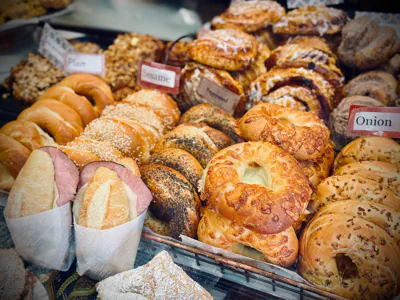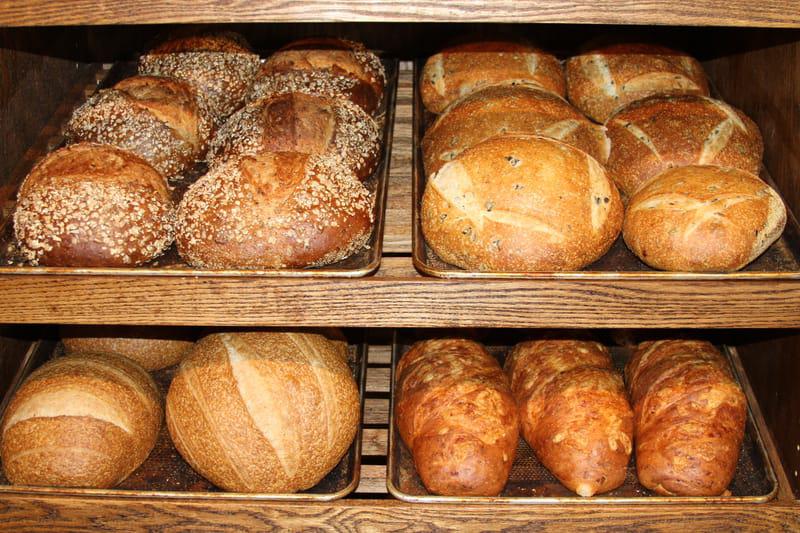The Essence of Jack Schat, Sr.
What is the essence of Jack Schat, Sr.? What is it that so conspicuously elevates him above and separates him from the average person today? Is it the old-world courtesy and the impeccable manners he extends to friends and strangers? Is it the vigor and health that until only recently he exuded in every step? Is it his lifelong commitment to hard work and dedication to high standards? Or did his upbringing in Utrecht, Holland, influence his strict self discipline and open reverence for life?
Family Origins in Utrecht

In his trailer home in Keough Hot Springs, recently “Papa” Jack talked proudly of himself and his family. He brought out family pictures, books and one large framed photograph of the bakery his father, P. A. Schat, founded in Utrecht in 1890. Above the doorway of the plant, in the same place that it hangs in a small model there in “Papa” Jack placed them in honor of one of his brothers who was a pilot and an inventor.
Early Life
“Papa” Jack was one of 10 children, six brothers, four sisters in the P.A. Schat family. When he was 14, he begged his father to take him into the bakery and let him learn the business. He was apprenticed to his father, helping around the bakery and his father retired. It was 1931. The Depression was at hand. Times were hard. In marriage a year later and he and his young bride Kine (pronounced Inga) struggled together to keep the bakery going. To save rent, they made use of their accommodation as their board as boarders.
The Beginning: Utrecht, Holland - 1890
“Papa” Jack was born into the P.A. Schat family that founded a bakery in Utrecht, Holland in 1890. He was one of several children and was apprenticed to his father at age 14, learning the baking trade. When he took over the family business in 1931, times were hard due to the Depression.
“Papa” Jack and his wife Kine worked inseparably at the bakery while a “nanny-cook” took responsibility for raising their children: Erick, Adrianne (Dan), Peter (a well-known European composer whose opera on Houdini was recently performed in Aspen, Colorado), and daughters Marion and Alida.
Innovation Before the War
During the economically challenging years before World War II, the Schats developed a special pancake mix. As “Papa” Jack recalled, “You needed only water to make a good pancake. We didn’t realize how it would help us later. During the war there was not enough flour, so such things became very valuable.”
The War Years: Courage Under Fire
When World War II erupted, “Papa” Jack faced unimaginable challenges. Queen Wilhelmina ordered people to watch for radio employers to stop Dutch workers since the Germans were forcing them into labor service for their troops. The Germans controlled the newspapers, trains, and food supplies.
A Dangerous Journey
During one harrowing incident, “Papa” Jack discovered that a German officer had “transferred” a bottle of oil and some bacon from his luggage. Furious but unable to protest, he drove toward the Zwolle bridge. While the crossing went smoothly, on the other side an English pilot, mistaking the truck for German, began firing on it. There was a wild exodus to the nearest fox holes.
During a lull, “Papa” Jack thought, “Ah, this is my chance,” and ran back to his truck to retrieve his stolen oil and bacon from the officer’s pack. “I put my life on the line for a piece of bacon and some oil,” he said, “and I later paid dearly for it.”
When he returned to the border, he found it surrounded by the Gestapo. The German officer had betrayed him, and he was taken to prison.
Imprisonment and Release
“They locked me up,” he said, “and they never touched me. The next day I was taken to court—the day I was let go. I never told so many lies in my life. But they let me go.”
Joining the Underground
After his release, he joined the Dutch Underground. There was no turning back to normal bakery work for the remainder of the war. However, toward the war’s end, he was rewarded when Canadian troops dropped food supplies 20 miles outside of Utrecht. He was allowed to load trucks and bring the supplies back to the people.
“I never heard so much cheering in the streets in my life. We were heroes. They knew we were bringing them food.”
Post-War Immigration: First Attempt
After the war, the Schats watched with growing apprehension as Russian influence spread across European countries. Convinced that Holland was also threatened, they decided to leave.
In 1947, “Papa” Jack and Kine arrived in Cerritos, California, where Kine’s brother operated a large dairy. He bought “Papa” Jack property in Artesia, a Dutch community, and encouraged him to open a much-needed bakery. They flew back to Holland to make arrangements, returning in 1948 to start the bakery and what they thought would be a new life.
Heartbreak and Return
But a phone call from Holland brought discouraging news: his brothers and their wives had changed their minds about emigrating to the United States. Nine months later, the U.S. Immigration Office notified “Papa” Jack that his time was up—he could no longer remain and must leave at once.
“I went back to Holland but I lost the bakery. You can’t run a bakery from 6,000 miles away.”
Return to America - 1957: Dreams Die Hard
Dreams die hard in the Schat family. In 1957, the whole family returned to California under the sponsorship of Jack Schat, Jr., who had come to America in 1950 and joined the U.S. Army Tank Corps.
With no job and $2,000 to their name, the 53-year-old “Papa” Jack settled his wife and children—sons Erick and Dan (Peter remained in Holland), daughter Marion (Alida followed later with her husband)—in a rented house in Los Angeles. He bought a car and, two weeks before Christmas, was hired as a temporary worker in a bakery.
The Move to Bishop
When he was down to exactly $300, welcome news came: there was an opening for a baker in Bishop, California. Once more, the family made the trek to rent a house and begin again. He went to work for the Keough Sheepherders Bread Bakery as the Senior Pastry Baker, with his son Jack Jr. working as the bread maker.
“At first we liked it. No telephone, no employees, no trouble. And then my wife said: why don’t we start again? Our own bakery.”
Building the Bishop Bakery: The American Dream
To open their own bakery and coffee shop, they needed to borrow about $13,000. Eight times, Jack tried to get a loan for the new Schat’s bakery on Main Street in Bishop. Each time he was unsuccessful.
Undaunted and undiscouraged, “Papa” Jack called on an old friend, Nol Yonig, a Dutch businessman in Southern California. When he heard what was needed, Yonig offered the amount as collateral, saying, “Nothing except my word—this man I believe in absolutely, without question.”
Family Dedication
It’s a familiar saga in the “American Dream” tradition. The family went to work in the small and ill-equipped bakery. Sons Erick and Bernard came to work before and after school. Jack Jr. worked on the original Sheepherders Bread, to which the Schats acquired the rights—rights that “Papa” Jack guarded closely.
Perhaps the hardest worker was Kine. She kept the bakery open all night on Fridays, the first store to do so in the area. It meant long, hard hours for her as she often walked home at dawn, desperately tired.
Although they later divorced, “Papa” Jack gave Kine full credit for her part in the family business: “She did a tremendous job. You can’t have success without a partner, and she was always completely determined to give 100 percent—that’s what she did. She earned that.”
Success and Tragedy
As Schat products became more and more popular, “Papa” Jack began planning for the future. He built a beautiful home overlooking Bishop and planned to give each of his children a share in the successful business so he could retire.
The End of an Era - 1981
Then, in April 1981, the man who had started with $300 in his pocket to build the second-largest payroll in Inyo County was fired. In a letter, he was asked to take a “leave of absence” with four weeks’ pay. It was an ignominious end to a lifetime career.
In his final days, “Papa” Jack spent time mostly in his trailer. He still managed a daily swim at the Keough Hot Springs pool, but his confident stride wasn’t as evident as before. He looked at his piano, often opened to the Pathétique Sonata, but said it hurt too much to concentrate. He had recently developed severe trembling in his hands.
A suggestion that he revisit his homeland, Holland, only brought a sad smile to his face. “Perhaps that is the last thing that would surprise anyone. But honestly, it would surprise me.”
The Legacy Lives On
This is the essence of the man—the “Essence of Papa Jack.” His story of resilience, courage, and unwavering dedication to the craft of baking lives on in every loaf that bears the Schat name. From the streets of Utrecht to Carson City, Nevada his legacy continues to inspire those who believe in the power of hard work, family, and the simple perfection of freshly baked bread.

